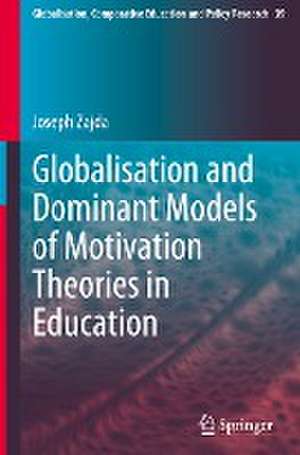Globalisation and Dominant Models of Motivation Theories in Education: Globalisation, Comparative Education and Policy Research, cartea 39
Autor Joseph Zajdaen Limba Engleză Hardback – 19 noi 2023
The book analyses such topics as Behaviourism, a major motivation model to improve performance in schools, cognitive theories for creating engaging learning environments, including achievement motivation, Social cognitive theories for improving engagement and motivation, social constructivism to improve students’ motivation and academic achievement, humanistic approaches for creating effective motivational environments, the use of discourse analysis in understanding motivation, and dominant values used in motivation in inclusive schools. This book contributes in a very scholarly way, to a more holistic understanding of the nexus between globalisation, dominant models of motivation, and students’ engaging learning environments, and their academic achievement.
Din seria Globalisation, Comparative Education and Policy Research
- 24%
 Preț: 731.71 lei
Preț: 731.71 lei - 20%
 Preț: 753.41 lei
Preț: 753.41 lei - 18%
 Preț: 727.66 lei
Preț: 727.66 lei - 15%
 Preț: 643.84 lei
Preț: 643.84 lei - 15%
 Preț: 636.63 lei
Preț: 636.63 lei - 15%
 Preț: 636.80 lei
Preț: 636.80 lei - 15%
 Preț: 637.28 lei
Preț: 637.28 lei - 15%
 Preț: 642.83 lei
Preț: 642.83 lei -
 Preț: 389.11 lei
Preț: 389.11 lei - 15%
 Preț: 643.00 lei
Preț: 643.00 lei - 15%
 Preț: 583.45 lei
Preț: 583.45 lei - 15%
 Preț: 646.62 lei
Preț: 646.62 lei - 24%
 Preț: 694.97 lei
Preț: 694.97 lei - 18%
 Preț: 731.59 lei
Preț: 731.59 lei - 15%
 Preț: 644.82 lei
Preț: 644.82 lei - 18%
 Preț: 939.77 lei
Preț: 939.77 lei - 15%
 Preț: 635.31 lei
Preț: 635.31 lei - 18%
 Preț: 941.82 lei
Preț: 941.82 lei - 18%
 Preț: 994.39 lei
Preț: 994.39 lei - 18%
 Preț: 724.80 lei
Preț: 724.80 lei - 18%
 Preț: 886.43 lei
Preț: 886.43 lei - 18%
 Preț: 887.86 lei
Preț: 887.86 lei - 18%
 Preț: 777.35 lei
Preț: 777.35 lei - 15%
 Preț: 642.51 lei
Preț: 642.51 lei - 18%
 Preț: 781.45 lei
Preț: 781.45 lei - 18%
 Preț: 775.65 lei
Preț: 775.65 lei - 18%
 Preț: 938.66 lei
Preț: 938.66 lei
Preț: 684.56 lei
Preț vechi: 900.73 lei
-24% Nou
Puncte Express: 1027
Preț estimativ în valută:
130.99€ • 137.15$ • 108.65£
130.99€ • 137.15$ • 108.65£
Carte tipărită la comandă
Livrare economică 07-12 aprilie
Preluare comenzi: 021 569.72.76
Specificații
ISBN-13: 9783031428944
ISBN-10: 3031428943
Pagini: 164
Ilustrații: XVI, 164 p. 5 illus., 4 illus. in color.
Dimensiuni: 155 x 235 mm
Greutate: 0.43 kg
Ediția:2023
Editura: Springer Nature Switzerland
Colecția Springer
Seria Globalisation, Comparative Education and Policy Research
Locul publicării:Cham, Switzerland
ISBN-10: 3031428943
Pagini: 164
Ilustrații: XVI, 164 p. 5 illus., 4 illus. in color.
Dimensiuni: 155 x 235 mm
Greutate: 0.43 kg
Ediția:2023
Editura: Springer Nature Switzerland
Colecția Springer
Seria Globalisation, Comparative Education and Policy Research
Locul publicării:Cham, Switzerland
Cuprins
1. Globalisation and dominant models of motivation theories affecting schools.- 2. Behaviourism as a major motivation model to improve performance in schools.- 3. Cognitive theories for creating engaging learning environments.- 4. Social cognitive theories for improving engagement and motivation.- 5. Social constructivism to improve students’ motivation.- 6. Humanistic approaches for creating effective motivational environments.- 7. The use of discourse analysis in understanding motivation.- 8. Dominant values used in motivation in inclusive schools.- 9. The impact of motivation on students’ engagement and performance.
Notă biografică
Joseph Zajda is Professor at the Faculty of Education and Arts, Australian Catholic University (Melbourne Campus). He specialises in globalisation and education policy reforms, social justice, history education and values education. He has written and edited 45 books and over 150 chapters and articles on globalisation and education policy, higher education, and curriculum reforms. He is also Editor of the 24-volume book series Globalisation, Comparative Education and Policy Research (Springer, 2009 & 2021). Recent publications include Zajda, J (Ed). (2020a). Globalisation, ideology and neo-liberal higher education reform. Dordrecht: Springer. Zajda, J. (Ed). (2020b). Human rights education globally. Dordrecht: Springer. Zajda, J. (Ed). (2020c). Globalisation, Ideology and Education Reforms: Emerging paradigms. Dordrecht: Springer; Zajda, J. (2018). He is Elected Fellow of the Australian College of Educators (FACE).
Textul de pe ultima copertă
This book analyses discourses of the use of motivation theories in schools globally. It focuses on the overall impact of motivation theories on teachers, students’ engagement, well-being, academic excellence, standards, equity and global competitiveness. It examines the role of motivation theories impacting on teachers and students in the classroom, and the overall impact of cognitive, social cognitive, affective and psycho-motor domains, used to motivate students to improve their performance in the classroom.
The book analyses such topics as Behaviourism, a major motivation model to improve performance in schools, cognitive theories for creating engaging learning environments, including achievement motivation, Social cognitive theories for improving engagement and motivation, social constructivism to improve students’ motivation and academic achievement, humanistic approaches for creating effective motivational environments, the use of discourse analysis in understanding motivation, and dominant values used in motivation in inclusive schools. This book contributes in a very scholarly way, to a more holistic understanding of the nexus between globalisation, dominant models of motivation, and students’ engaging learning environments, and their academic achievement.
The book analyses such topics as Behaviourism, a major motivation model to improve performance in schools, cognitive theories for creating engaging learning environments, including achievement motivation, Social cognitive theories for improving engagement and motivation, social constructivism to improve students’ motivation and academic achievement, humanistic approaches for creating effective motivational environments, the use of discourse analysis in understanding motivation, and dominant values used in motivation in inclusive schools. This book contributes in a very scholarly way, to a more holistic understanding of the nexus between globalisation, dominant models of motivation, and students’ engaging learning environments, and their academic achievement.
Caracteristici
Provides an overview of education policy changes in globalisation, motivation, and students’ engagement Offers ideas on creating engaging learning environments for teachers, policy-makers and educational leaders Demonstrates discourses of dominant models of motivation and their impact on students’ engagement and performance
